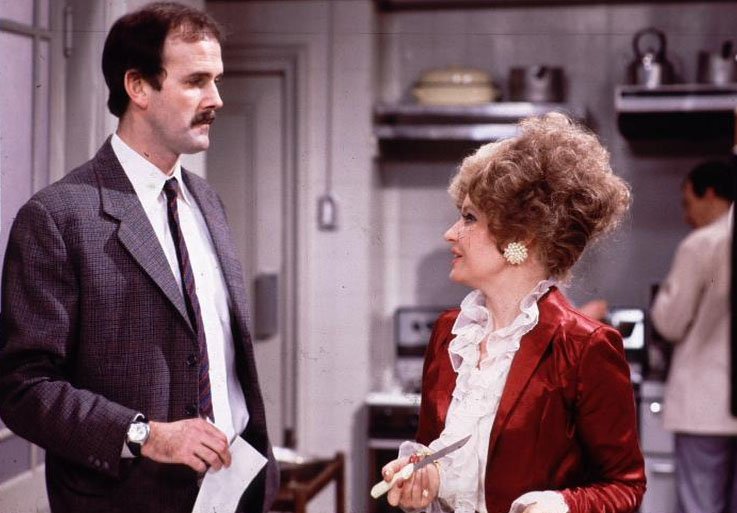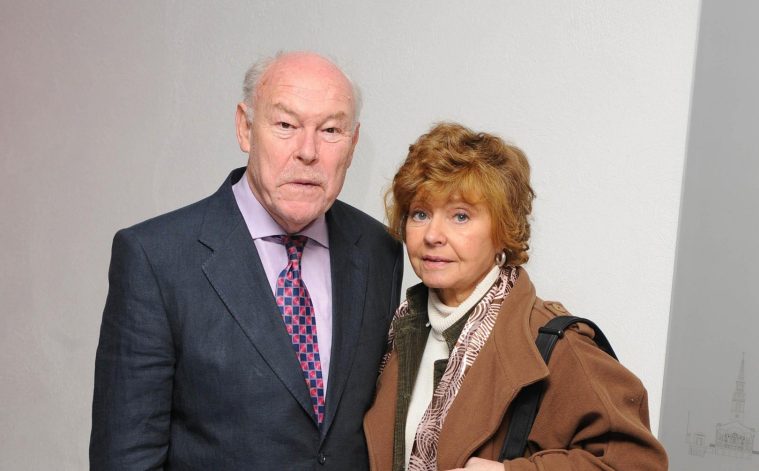The late actor was best known as Basil’s nagging wife – but its her work beyond Fawlty Towers that gives a glimpse at the real Prunella Scales
In a statement today, announcing the death of Prunella Scales at the age of 93, the actor’s sons, Samuel and Joseph, remarked that their mother was watching Fawlty Towers on the day before she died.
As it happens, my wife and I were also watching Fawlty Towers last weekend – and we were both struck anew by how Scales’s character, Sybil Fawlty, was the engine room of this classic 1970s sitcom – the centre around which John Cleese could embark on his manic clowning as snobbish Torquay hotelier Basil. Sybil, with her selection of wigs and grating laugh (described by Basil as “someone machine-gunning a seal”), was the super-efficient yin to Basil’s chaotic yang.
And while Basil may have physically towered over “my little commandant” (one of his nicer epithets for his wife), he was constantly terrified of her.
Cleese and Andrew Sachs, as Spanish waiter Manuel, often received the plaudits for their more physical comedy, but Scales gave the greater acting performance. She even imbued Sybil with a degree of pathos, as in the episode where Basil pretends to have forgotten their wedding anniversary.

Her experience on stage helped: she had played a number of leading classical roles in the thriving regional theatre of the 1950s, from Shakespeare’s Olivia in Twelfth Night to Hermione in The Winter’s Tale. She simultaneously showed off her gift for comedy on the West End and Broadway stage, whether opposite Celia Johnson in Noel Coward’s Hay Fever or Leonard Rossiter in Michael Frayn’s Make and Break.
Fawlty Towers is the show that Scales will undoubtedly be best remembered for. But that performance was equalled (and in some respects bettered) by her role as Elizabeth Mapp in Channel 4’s glorious 1985 adaptation of E F Benson’s Mapp and Lucia novels of social one-upmanship in 1930s Sussex. Forever thwarted by the glamorous Lucia (Geraldine McEwan at her most acerbic) in her attempts to become the queen bee of fictional Tilling, Scales gave a masterclass in frumpy frustration.
And while actors of the calibre of Helen Mirren, Olivia Colman and Imelda Staunton have portrayed Queen Elizabeth II, arguably none have equalled Scales’s sly rendition of the monarch in Alan Bennett’s A Question of Attribution – first at the National Theatre in 1988 and then on television three years later. She managed to convey the Queen’s quiet humour as she quizzed Soviet spy turned art historian Anthony Blunt about the authenticity of a work of art.
In 2014 “Pru”, along with her husband Timothy West, who died last year, found a whole new audience with their Channel 4 series Great Canal Journeys. Over the course of 10 series, this became not only a gentle and utterly charming travelogue but a portrait of a long and loving marriage.

It also unwittingly came to chart Pru’s decline in health, described by one reviewer as “the long, slow goodbye that is living with dementia.” Scales was officially diagnosed with vascular dementia in 2013, and the couple openly addressed her condition on the programme. Both the Alzheimer’s Society and Alzheimer’s Research UK thanked the couple for using their platform to raise awareness and combat the stigma around dementia.
Despite the length and range of her career, perhaps the abiding memories of Scales will be of Sybil Fawlty, fag in one hand and a telephone receiver in the other, as she addresses her friend Audrey. “Ooohhh, I knooooow”, before noticing her husband doing something foolish and calling him up short with a brusque “Basil!”.
Unlike her partnership with West, why Basil and Sybil ever got married in the first place is a mystery. But their dysfunctional union remains one of greatest joys of British comedy.
